Adcirca
Adcirca dosages: 20 mg
Adcirca packs: 10 pills, 20 pills, 30 pills, 60 pills, 90 pills
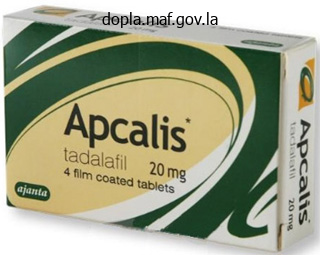
20 mg adcirca buy with amex
The tumor-secreted products alpha-fetoprotein and betahuman chorionic gonadotropin should also be monitored erectile dysfunction doctors in pa purchase 20 mg adcirca free shipping. Paraganglioma Paragangliomas and pheochromocytomas are rare, morphologically identical neuroendocrine tumors, with pheochromocytoma designating those that arise from the adrenal medulla, whereas paragangliomas are those that arise in various locations extra-adrenally along the parasympathetic and sympathetic chain. Most paragangliomas of the head and neck are nonsecreting (nonfunctional) tumors from parasympathetic tissues. Biochemical diagnosis may be typically made with plasma and urine fractionated metanephrines. Despite aggressive multimodality therapy including surgical resection and radiation therapy, current fatality rates remain high, and ongoing studies are warranted to improve the course of this malignancy. Decision-making regarding genetic testing should be considered carefully with families as well as pediatric patients as developmentally appropriate, in the context of pre- and posttesting counseling, as recommended by the American Society of Clinical Oncology. In equatorial Africa, for instance, 50% of pediatric cancers are lymphomas, due to the predominance of endemic Burkitt lymphoma. Children with Kaposi sarcoma may present with manifestations in the head and neck such as brawny and disseminated lymphadenopathy, multifocal oral, facial, scalp, or tracheal lesions and nodules. Although the survival of children with cancer has dramatically improved in recent decades, unfortunately, for the 80% of children in the world with cancer who live in low- and middle-income settings, outcomes are significantly poorer. Thus, effective diagnosis and management of a mass in the head and neck warrant considerations of an effective chain of care, from preoperative management of infections through to safe anesthesia and intensive care, alongside appropriate handling of tissue specimens and care coordination among trained team members, feasibility of local control including access to complex surgery and radiotherapy, and timely delivery of multimodality therapy. Outcomes in resourcelimited settings even for typically curable cancers are thus limited by high rates of progressive disease, treatment- and infection-related morbidity and mortality, as well as treatment refusal and treatment abandonment (the failure to complete curative therapy). Initially, flaps were selected randomly based on criteria such as proximity to a soft tissue defect and geometry rather than on specific knowledge of the pattern or reliability of the blood supply. Myocutaneous flaps were added to the list of available flaps in the 1970s, and this improved the facility with which immediate reconstructions were reliably performed. Free microvascular tissue transfer is now routinely used in reconstructive surgery. Reconstructive microsurgery has become an integral part of head and neck reconstruction, allowing the completion of complex resections with predictable outcomes. Common flaps and their reconstructive applications include (but are not limited to) ones listed in Table 24. Despite these limitations, some general observations with regard to indications for free flap reconstruction, needed for surgical planning to incorporate future facial growth and dental rehabilitation, have been made. Future advances with newer alloplasts, virtual surgical planning, and distraction osteogenesis will no doubt improve treatment of these patients. In general, pediatric patients lack the numerous comorbid conditions of adult head and neck cancer patients. General discussions about principles of head and neck reconstruction and techniques can be found elsewhere in this text. Thus, the following discussion is focused on issues specifically relevant to pediatric head and neck cancer reconstruction in the pediatric age group.
Buy adcirca 20 mg low cost
Differentiation between schwannoma of the vagus nerve and schwannoma of the cervical sympathetic chain by imaging diagnosis erectile dysfunction etiology buy genuine adcirca on-line. Parapharyngeal space schwannomas: preoperative imaging determination of the nerve of origin. Splaying of the carotid bifurcation caused by a cervical sympathetic chain schwannoma. Neck nerve trunks schwannomas: clinical features and postoperative neurologic outcome. Schwannoma in head and neck: preoperative imaging study and intracapsular enucleation for functional nerve preservation. Surgical management of parapharyngeal space tumours: results of 10-year follow-up. Modifications of the midline mandibulotomy for access to the parapharyngeal space. Transoral robotic surgery for neurogenic tumors of the prestyloid parapharyngeal space. Parotid pain following superior cervical ganglionectomy: a clinical example of the antagonistic action of the parasympathetic and sympathetic systems. The external ears are susceptible to sun exposure accounting for the relatively high rate of skin cancer occurrence. Whereas the anatomic location of the ears makes them susceptible to sun-related skin cancers, the temporal bone is rarely the site of primary malignancy. Untreated external ear and periauricular skin cancers, on the other hand, can invade into the ear canal, mastoid, or stylomastoid region. Furthermore, tumors of the parotid gland, temporomandibular joint, and infratemporal fossa also erode into the ear canal and middle ear and can require a temporal bone approach for management. In comparing the incidence of left to right, these differences range from 62% to 38% to 47% to 53%. In a large series of temporal bone cancers, 75% of patients were men, and the average age was 65 years. In the United States, roughly 1% of the 48,000 new cases of melanoma involve the outer ear. The presence of metastatic neck disease was found to be a significant correlate for survival. Temporal Bone Perhaps as a result of its location in the lateral skull base, the temporal bone is affected by a long list of tumor types (Table 23. The area in front of the ear, at the sideburn in men, marks an area of embryologic fusion plane. The scapha is divided by branching of the antihelix, thus creating a fossa triangularis.
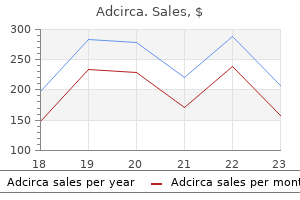
Buy adcirca 20 mg with visa
It is difficult to compare the outcomes of these two divergent strategies because the former (primary surgery) is more often reserved for "resectable" disease erectile dysfunction pump how do they work discount adcirca 20 mg visa. This selection bias will preferentially include the less common but favorable disease for surgical treatment and assign patients with more advanced and less favorable disease to nonsurgical therapy. It is no surprise then that reported 5-year survival rates range from <10% to over 65%. The rationale for this strategy is the relatively high risk of distant metastasis, which is a major component of treatment failure and death from disease. We treated 30 consecutive patients with this approach, and all but one patient had T4 (26 patients, 87%) or T3 (3 patients, 10%). Patients with complete or partial response were more likely to receive chemoradiation (11/18, 61%) or radiation (5/18, 28%) than surgery (2/18, 11%) for their subsequent definitive locoregional therapy. By contrast, patients who showed no response to induction chemotherapy (stable or progressive disease) were more likely to receive surgery (8/11, 73%) than chemoradiation or radiation (4/11, 37%) for subsequent locoregional therapy. The limited number of cases published hampers evaluating the ideal treatment strategy. The majority of patients presented with T3 or T4 disease (78%) and was node negative (82%). The most common sites of tumor origin were the ethmoid sinus (64%), the nasal cavity (32%), and the maxillary sinus (14%). Approximately half of the cohort received surgery as the primary treatment modality and one-third received chemoradiation therapy. The incidence of local, regional, and distant failure was 21%, 25%, and 18%, respectively. A complete response to neoadjuvant chemotherapy correlated with improved survival at 3 years. Although cutaneous melanoma is by far the most common type, melanomas can arise in any organ in which melanin-containing cells are present. The lateral nasal wall is the most often affected site, followed by the nasal septum, maxillary sinus, and ethmoid sinus. In 1970, Ballantyne introduced a clinical staging system for mucosal melanomas of the head and neck. To address this problem, others have proposed a microstaging system for patients with node-negative disease (Ballantyne stage I) based on histopathologic features such as depth of invasion and tumor architecture. Other authors have also described the prognostic value of this staging system in smaller series. The invasive and locally advanced nature of these tumors coupled with the anatomical complexity of the sinonasal passages and proximity to vital structures makes a complete resection difficult in most cases. Surgical margins are described as microscopically positive or close (within 1 mm) in more than 20% of patients. Although negative margins are associated with better local disease control, the impact of surgical margins on survival is less clear. Elective treatment of the neck is usually not performed, as the incidence of nodal disease at the time of presentation is relatively low, ranging from 6% to 25%.
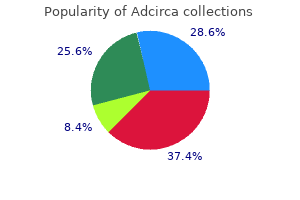
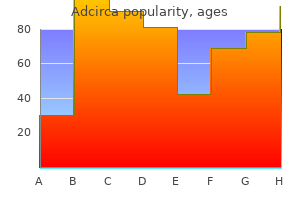
Cheap 20 mg adcirca otc
Also erectile dysfunction treatment medicine buy adcirca 20 mg cheap, the survival decreases significantly from 5 to 10 years after treatment, which warrants a long-term surveillance in these patients. These cancers manifest as a rapidly growing mass and occur in patients over 50 years of age, with a male to female ratio of 4:1. Most patients present with advanced stage disease: one-third of them suffer recurrence, 46% develop distant metastases, and 65% die of the disease, usually within 4 years of diagnosis. The malignant component usually features a poorly differentiated adenocarcinoma or an undifferentiated carcinoma. Despite its overall good prognosis, the potential of local recurrence or distant metastases exists, especially in advanced stage or improperly treated tumors. Lymphomas of the salivary glands arise either from intraglandular lymph nodes (nodal) or from the nondiscrete lymphoid tissue within the gland parenchyma (extranodal). Although extranodal lymphomas affect salivary glands in only ~5% of cases, the overwhelming majority of these occur in the parotid gland. Lymphoma of the salivary glands either can be the only manifestation of the disease in primary cases or can also be a part of a disseminated lymphomatous process. Therefore, every patient with a parotid mass with cutaneous histology should undergo careful examination of the skin of the head and neck. Involvement of the salivary glands by the distant infraclavicular metastatic cancers is extremely rare. When it does occur, the parotid gland is most commonly affected, and the most common sites giving rise to these metastases are the lung, kidney, and breast. In order to guide the prognostic and management decision making, it was proposed to grade salivary tumors based on their clinical behavior. The association between tumor histology and local, regional, and distal control and overall outcomes has been demonstrated. For instance, grading is the most important consideration in prognosis and management of mucoepidermoid carcinoma. Surgical excision is sufficient for low-grade cancers, rendering an overall 5-year survival of over 90%. However, for high-grade cancers, overall survival drops below 50% and adjuvant radiation and neck dissections are required.
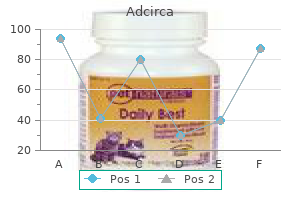
20 mg adcirca buy overnight delivery
They include (1) the thick bicortical bone stock erectile dysfunction jet lag generic adcirca 20 mg, which facilitates dental prosthetic rehabilitation with osseointegrated implants; (2) the ability of the donor site scar to be well hidden by conventional undergarments; and (3) the ease of flap harvest by a separate surgical team with the patient in a supine position. A total of 10 to 16 cm of bone can be harvested, and osteotomies can be made to reconstruct hemimandibular or angle-to-angle defects. Furthermore, depending on the soft tissue needs of the patient, the iliac crest free flap can be harvested as an osseous flap, an osteocutaneous flap, or a tripartite osteomyocutaneous flap when used in combination with the internal oblique muscle. The iliac crest free flap with the internal oblique muscle has been applied to palatomaxillary reconstruction with good results, allowing placement of osseointegrated implants and closure of the palate with the use of the soft tissue components. Alternatively, the highly mobile, thin, and well-vascularized internal oblique muscle can be used to resurface defects in the oral cavity and pharyngeal mucosa. Similarly, a portion of the muscle can be used to cover the bone graft and reconstruction plate. Skin grafting of the internal oblique muscle is unnecessary because the well-vascularized flap rapidly mucosalizes. The denervated muscle subsequently undergoes atrophy and provides a thin, well-vascularized, and immobile layer of tissue over the mandible. The osteocutaneous flap has been used for reconstruction of the anterior mandible in association with total or subtotal glossectomy defects. In this instance, the iliac bone is placed transversely in the floor of the mouth to support the skin paddle, which is used to reconstruct the tongue. Excellent long-term maintenance of the height of the neotongue has been reported with this flap design. Because most of the lower abdominal wall muscles and part of the inguinal ligament are divided, ventral hernia formation is a significant potential risk. Meticulous closure of the donor site, including the use of mesh for select cases, helps to minimize this risk. The patient experiences postoperative hip pain and weakness, but this generally subsides after several weeks. Despite these potential donor site problems, extensive clinical experience with the iliac crest free flap has demonstrated its reliability in achieving functional oromandibular reconstruction for even the most complex composite mandibulectomy defects. Flaps based on the distal ramifications of the subscapular artery provide a wide array of available tissue for reconstruction of defects in the head and neck. These flaps include the scapular and parascapular fascial or fasciocutaneous free flaps, the lateral or medial scapular osteocutaneous free flaps, the serratus anterior flap, the latissimus dorsi muscle or myocutaneous flap, the latissimus dorsi-rib flap, and the serratus anterior-rib flap. The latissimus dorsi muscle may be harvested as a pedicled or free muscle flap, a myocutaneous flap, or an osteomyocutaneous flap incorporating a segment of rib. The thoracodorsal artery is consistently accompanied by the thoracodorsal vein and the thoracodorsal nerve, which is the motor nerve to the latissimus dorsi muscle.
Adcirca 20 mg buy on line
With the orbit retracted laterally and protected with a malleable brain retractor impotence synonym buy 20 mg adcirca overnight delivery, the lamina papyracea is identified and, if necessary, resected. A complete sphenoethmoidectomy is done, staying below the level of the frontoethmoidal suture to avoid injury to the floor of the anterior cranial fossa. The superior attachment of the middle turbinate is then transected along the roof of the nose. Posteriorly, the lateral nasal wall cuts are connected with right-angled scissors behind the turbinates. The specimen is thus delivered and examined for margins with frozen section control. If the tumor involves the nasal septum, it should be included in the resection specimen by adding appropriate septal cuts to allow for tumor-free margins. Closure is begun by reattachment of the medial canthal tendon to the nasal bone in its anatomic position. If a sublabial approach is done, the mucosal incisions are closed with absorbable suture. This procedure involves resection of the inferior maxillary sinus below the plane of the infraorbital nerve. It is most commonly used for neoplasms of the alveolar process of the maxilla with minimal extension to the maxillary antrum. Similarly, lesions of the hard palate sparing the antrum can be treated by an inferior maxillectomy. Alternatively, a midfacial degloving can be used for lesions crossing the midline and involving the inferior maxilla bilaterally. Gingivobuccal and palatal incisions and osteotomies are done around the lesion as shown in (A). If there is adequate space between the central incisors, the osteotomy may be performed using a microreciprocating saw in the interincisor space. Otherwise, the ipsilateral central incisor should be extracted and the osteotomy placed in the tooth socket in order to avoid loss of bony support to the remaining contralateral incisor. Inferior maxillectomy specimen (B) showing adequate surgical margins around an upper alveolar ridge carcinoma (arrow). If the extent of resection requires a total maxillectomy, the lateral rhinotomy incision may be extended by adding lip-splitting, gingivobuccal, and palatal incisions inferiorly. The lip-splitting incision, which may be done along the philtrum or in the midline, connects the lateral rhinotomy with the sublabial incision, thus allowing more lateral elevation of the facial flap. The gingivobuccal incision starts from the lip-splitting incision and extends as far laterally as the region of the first molar and over the lateral surface of the maxillary tuberosity. In patients undergoing total maxillectomy, a median or paramedian palatal incision is performed over the hard palate extending from an interincisor space anteriorly, to the junction of the soft and hard palate posteriorly. B: the exposure offered through an extended lateral rhinotomy shown in this figure is not less than that offered by the Weber-Fergusson incision.
Buy 20 mg adcirca amex
Even so impotence vs infertile buy adcirca 20 mg mastercard, most of these cancers will have been present in some form for many months after home treatment with antibiotic ointment or skin creams has failed. But this delay is often offset by the fact that these cancers tend to be slow growing, tending toward more superficial lateral growth while remaining confined to the vermilion or immediate submucosal tissues until later in their course. A small percentage of patients will postpone evaluation until later in the course of the disease, by which time the cancer has grown to involve the musculature of the lip. The size of the primary cancer is one of the most significant factors in predicting prognosis. That when tumors grow to a size larger than 4 cm (T3), the 5-year survival rates drop to 60%. Studies also consistently indicate that the rate of metastases increases with the size of the cancer; regional nodal metastasis has been found to be 5% for T1 lesions, 50% for T2 lesions, and 70% for T3 lesions. Eighty percent of patients with perineural spread will have concomitant nodal metastasis. Classical clinical symptoms of perineural spread such as tingling, numbness, and pain cannot be relied upon as early indicators. Several cases have been reported with early spread along the inferior alveolar nerve extending to the cranial cavity, despite the lack of symptoms and a relatively small cancer. This must include curative management of the primary cancer and for any regional metastasis that may be present. Choice of treatment is made based on the preferences of both physician and patient, taking into account size, location, age, concomitant medical conditions, the likelihood that function of the lip and/or cosmesis can be preserved or restored, the relative ease of treatment delivery, and considerations of time and cost. A variety of therapeutic methods have been successfully employed in the treatment cancers of the lip, to include surgical excision alone, radiation therapy alone (external beam, or brachytherapy), or combined surgical excision and radiation therapy. Most studies have shown that surgery or radiation therapy produce similar cure and cosmetic results for small tumors. Radiation Therapy Radiation therapy may consist of brachytherapy, external beam, or a combination of the two. Brachytherapy is a method of radiation therapy that employs the use of interstitial placement of radioactive implants. These are placed directly into the cancer and are carefully positioned to give a planned therapeutic dose to all parts of the cancer. Current practice favors the use of lower-energy radioisotopes such as iridium-192. First, hollow, nonradioactive needles are placed and checked radiographically for proper placement. It is important that accurate spacing of the needles be performed at each session, as overlapping of the radiation points creates problems of uneven distribution of the radiation. Brachytherapy has a reported local recurrence-free survival of 93% following treatment. External beam radiation has become the preferred form of radiation therapy when treating lip cancers, particularly for tumors smaller than 1. Treatment dosages typically vary from 5,000 to 7,000 cGy depending on the extent of the tumor and are generally fractionated over the course of 6 weeks.
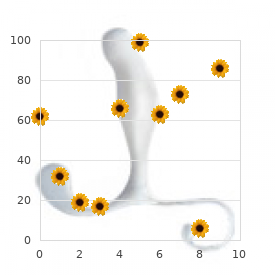
Purchase 20 mg adcirca
Locally recurrent nasopharyngeal carcinoma: treatment results for patients with computed tomography assessment erectile dysfunction treatment hyderabad adcirca 20 mg buy mastercard. Reirradiation for locally recurrent nasopharyngeal carcinoma: treatment results and prognostic factors. Dosimetric and clinical results of three-dimensional conformal radiotherapy for locally recurrent nasopharyngeal carcinoma. Stereotactic radiosurgery versus gold grain implantation in salvaging local failures of nasopharyngeal carcinoma. Stereotactic radiosurgery plus intracavitary irradiation in the salvage of nasopharyngeal carcinoma. Outcome of fractionated stereotactic radiotherapy for 90 patients with locally persistent and recurrent nasopharyngeal carcinoma. Robotic system-based fractionated stereotactic radiotherapy in locally recurrent nasopharyngeal carcinoma. A retrospective comparison of robotic stereotactic body radiotherapy and three-dimensional conformal radiotherapy for the reirradiation of locally recurrent nasopharyngeal carcinoma. Reirradiation of locally recurrent nasopharynx cancer with external beam radiotherapy with or without brachytherapy. Initial experience using intensity-modulated radiotherapy for recurrent nasopharyngeal carcinoma. Long-term outcomes and prognostic factors of re-irradiation for locally recurrent nasopharyngeal carcinoma using intensity-modulated radiotherapy. Effectiveness and toxicities of intensity-modulated radiotherapy for patients with locally recurrent nasopharyngeal carcinoma. Intensity-modulated radiation therapy in the salvage of locally recurrent nasopharyngeal carcinoma. Linear accelerator-based stereotactic radiosurgery for limited, locally persistent, and recurrent nasopharyngeal carcinoma: efficacy and complications. Comparison of single versus fractionated dose of stereotactic radiotherapy for salvaging local failures of nasopharyngeal carcinoma: a matched-cohort analysis. Linear accelerator based radiosurgery as a salvage treatment for skull base and intracranial invasion of recurrent nasopharyngeal carcinomas. Prognostic model for survival of local recurrent nasopharyngeal carcinoma with intensity-modulated radiotherapy. Endoscopic nasopharyngectomy for salvage in nasopharyngeal carcinoma: a novel anatomic orientation. Endoscopic microwave coagulation therapy for early recurrent T1 nasopharyngeal carcinoma. Transcervico-mandibulo-palatal approach for surgical salvage of recurrent nasopharyngeal cancer. Surgical management of recurrent nasopharyngeal carcinoma after radiation failure at the primary site.
Rakus, 21 years: Overall, the most commonly used model across a range of radiation doses is currently the linear-quadratic model. One is to position the fibula more superiorly and use the reconstruction plating system to reproduce contours of the inferior border.
Goran, 29 years: This information helps to inform patients and their families about what to expect during the course of care and facilitates decision making among treatment options. We were also able to identify and dissect the role played by factors responsible for the initiation and maintenance of lactation, such as exteroceptive stimuli from the pups and length of the intervals between suckling episodes in rats and rabbits (Mena et al.
Ugo, 33 years: Furthermore, a past history of easy intubation does not guarantee that the patient remains easy to intubate because, in the interval, the tumor may have rapidly enlarged or postradiation trismus may have worsened. Radiation has been shown by a number of groups to result in improved oxygenation of previously hypoxic tumor regions.
Shakyor, 35 years: The ethmoids are less commonly affected, and the frontal and sphenoid sinuses are rarely affected. The olfactory nerve fibers arise from the bipolar olfactory cells and unite in fasciculi, which form a plexus beneath the mucous membrane and then ascend passing into the skull through the foramina in the cribriform plate.
Joey, 50 years: Histopathologic predictors of recurrence after neck dissection in patients with lymph node involvement. The most common sites of tumor origin were the ethmoid sinus (64%), the nasal cavity (32%), and the maxillary sinus (14%).
Orknarok, 37 years: Response rates have varied from 20% to 40% in the recurrent or metastatic disease setting. Any defect in the esophagus is repaired primarily in two layers with fine interrupted sutures and is reinforced with autologous tissue such as a strap muscle.
Fedor, 42 years: The population attributable risk for tobacco is greater (52%) than that for alcohol (3%). The superior attachment of the middle turbinate is then transected along the roof of the nose.
10 of 10 - Review by D. Arokkh
Votes: 166 votes
Total customer reviews: 166
